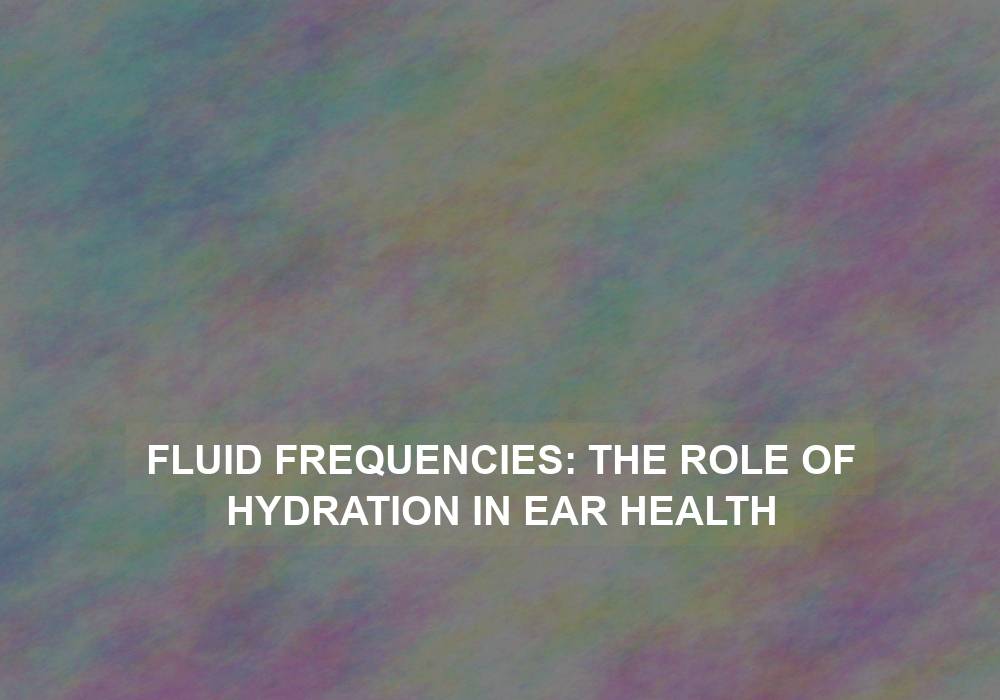Proper hydration is crucial for maintaining overall health and well-being. While most people are aware of the importance of hydration for their bodies, many overlook the impact it can have on their ear health. In this article, we will explore the significance of hydration in maintaining healthy ears and preventing common ear-related ailments.
Understanding the Importance of Hydration
Water is essential for various bodily functions, including maintaining proper fluid balance, regulating body temperature, lubricating joints, and aiding in digestion. These benefits extend to our ears as well, as the ear is a complex organ comprising delicate structures that require sufficient hydration to function optimally.
Hydration is particularly important for the ears due to the presence of the Eustachian tube. The Eustachian tube is a narrow passage that connects the middle ear to the back of the throat. It plays a crucial role in regulating pressure in the middle ear and allowing the drainage of fluid. Adequate hydration helps keep the Eustachian tube functioning properly, preventing issues such as ear congestion, muffled hearing, and even ear infections.
Moreover, hydration plays a vital role in preventing ear infections. When the body is dehydrated, the immune system weakens, making it more susceptible to infections, including those affecting the ears. Moisture is crucial in preventing the accumulation of bacteria and viruses, which can cause ear infections such as otitis media or swimmer’s ear.
In addition to this, dehydration can lead to a dry ear canal, causing discomfort and itching. When the ear canal lacks moisture, the skin inside becomes more vulnerable to irritation and can potentially increase the risk of developing conditions like eczema in the ear.
How Dehydration Affects Ear Health
Dehydration occurs when the body loses more fluids than it takes in, leading to an imbalance in the body’s water content. When we are dehydrated, it can negatively impact our ears in several ways:
-
Impaired Eustachian Tube Function: The Eustachian tube, responsible for regulating pressure in the middle ear and draining fluid, may not function properly when dehydrated. This can lead to issues like ear congestion, muffled hearing, or even ear infections. Ensuring proper hydration helps maintain the optimal function of the Eustachian tube.
-
Increased Risk of Ear Infections: Lack of proper hydration can make the body more susceptible to infections, including those affecting the ears. Moisture is crucial in preventing the accumulation of bacteria and viruses, which can cause ear infections such as otitis media or swimmer’s ear. By staying hydrated, you can strengthen your immune system and reduce the risk of developing these infections.
-
Dry Ear Canal: Dehydration can lead to a dry ear canal, causing discomfort and itching. Dry skin inside the ear can make it more vulnerable to irritation and potentially increase the risk of developing conditions like eczema in the ear. Proper hydration helps maintain the moisture balance in the ear canal, keeping the skin healthy and reducing the likelihood of dryness and irritation.
To maintain proper hydration for optimal ear health, consider the following tips:
-
Drink Sufficient Water: The recommended daily water intake varies depending on factors such as age, activity level, and climate. As a general guideline, aim to drink at least eight glasses (64 ounces) of water per day. However, individual needs may vary, so adjust your water intake accordingly.
-
Limit Dehydrating Beverages: Certain drinks like coffee, tea, and alcohol can act as diuretics, causing increased urine production and potentially contributing to dehydration. While it’s not necessary to eliminate these beverages entirely, moderation is key. Ensure you balance your intake with an adequate amount of water to maintain hydration levels.
-
Increase Water-Rich Foods: Incorporate water-rich fruits and vegetables into your diet. Foods like watermelon, cucumbers, oranges, and strawberries not only provide hydration but also offer essential vitamins and minerals that promote overall well-being. Including these foods in your diet can help supplement your water intake and support optimal hydration.
-
Monitor Urine Color: One way to gauge your hydration level is by observing the color of your urine. Ideally, it should be pale yellow or clear. Darker urine may indicate dehydration, signaling that you need to increase your water intake.
In addition to staying hydrated, there are other steps you can take to ensure the well-being of your ears:
-
Avoid Excessive Noise Exposure: Prolonged exposure to loud noises can damage the delicate structures of the ear, leading to hearing loss or tinnitus. Whenever possible, wear ear protection, such as earmuffs or earplugs, in environments with high noise levels. This helps minimize the risk of noise-induced damage and supports long-term ear health.
-
Practice Good Ear Hygiene: Clean your ears gently and regularly to remove excess wax and prevent blockages. However, it’s important to note that inserting objects like cotton swabs into the ear canal can be harmful and should be avoided. Seek professional help if you experience excessive earwax buildup or any discomfort related to ear hygiene.
-
Seek Professional Help: If you experience persistent ear pain, discomfort, or any changes in your hearing, it’s essential to consult a healthcare professional. They can diagnose any underlying conditions and provide appropriate treatment if necessary. Regular check-ups with an audiologist or an ear, nose, and throat specialist can help ensure the early detection and management of any ear-related issues.
Conclusion
Fluid frequencies play a crucial role in maintaining optimal ear health. By prioritizing hydration, you can support the proper functioning of your ears, prevent common ailments, and promote overall well-being. Remember to drink enough water, limit dehydrating beverages, and incorporate water-rich foods into your diet. Additionally, take proactive measures to protect your ears from excessive noise exposure and practice good ear hygiene. By following these steps, you can enjoy healthy ears and all the wonders of sound they bring.
